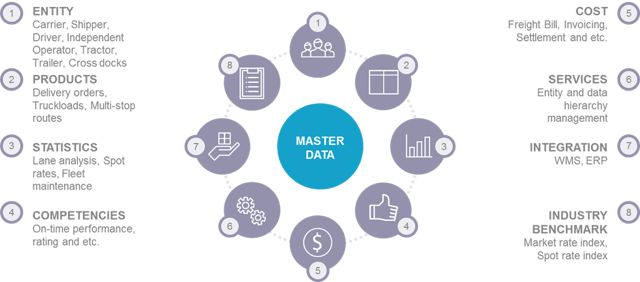Seven-hundred billion: the current dollar value attributed to the American trucking industry, and a figure representing that industry’s significant contribution to the nation’s annual Gross Domestic Product. In the United States, trucks handle approximately 70% of all freight shipments. Considering these numbers, it is not surprising that the US trucking industry is occasionally referred to as the backbone of the national economy.
Like all business enterprises, however, the transportation management industry faces mammoth challenge as evolving market trends compel it to discover methods to reduce operating costs, accelerate revenue growth, enhance customer service and meet hardline corporate objectives. To this end, the industry has slowly come to embrace technology and seek out fleet management solutions. By not keeping pace with the robust technology investments seen in other sectors, the transport management industry is rife with disruption – but solutions for navigating current and future market trends and associated challenges exist.
Companies seeking strategic guidance should look to innovative business intelligence and logistics software options that integrate and optimize services. Among these cutting-edge technologies: Master Data Management (MDM), in which comprehensive data is stored in one secure master file. This single reference point refines information sharing among staff and departments, and helps users make more knowledgeable decisions surrounding rating, planning and expediting.

MDM delivers multiple dispatch and logistics advantages, including:
- Information access at border checkpoints – Customs and Border Patrol guidelines on freight transportation across national borders grow more stringent every year, leading to additional work for logistics providers and causing stoppages that affect the supply chain. A transportation MDM, which integrates load stats (including product composition and intended use) to an external system, can help alleviate delays and streamline the process.
- Dock conflict resolution – Dock-booking conflicts and interruptions mean unproductive drivers. Solutions that identify disputes and alert drivers in real-time about delays allow for more effective time management and prevent additional supply chain issues.
- Shared pool points – MDM software with access to pool points permitting local processing and routing allows carriers to use third-party facilities anywhere throughout the nation, creating opportunity for cost reduction.
- Key metrics tracking – Data management apps offer customer-friendly ratings information about carriers, shippers and drivers, as well as on-time performance stats, delivery time windows and capabilities and equipment limitations.
- Fleet Maintenance – In-route repairs are costly, time consuming, and often problematic. MDM tools with access to service centers, along with the services provided and parts inventory, can simplify this function.
- Unstructured data organization – Communications via email and text messaging have left organizations with accumulated and disorganized data. A solution dedicated to interpreting unstructured data permits users to take action when warranted.
Trucking companies eager to remain competitive and retain market share must reevaluate their current strategies, target new methods to simplify business processes and make use of their data. Download our TMW report on the future of trucking, “Transportation Institution vs. Information,” for a valuable reference.



